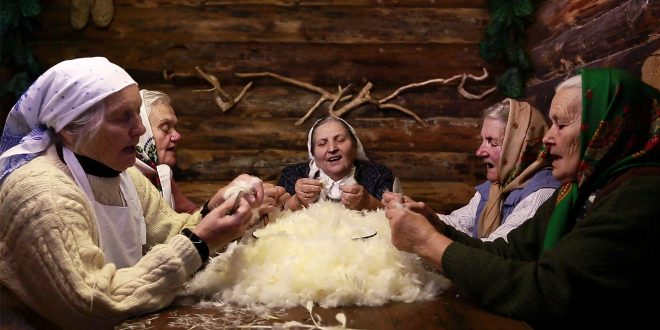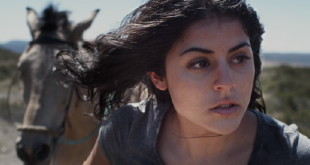Music documentaries rarely make it to the multiplex. Last year brought in a couple of rare music doc hits, but their success may have had less to do with music than with the irresistible allure of beautiful women with appetites for destruction, i.e., Amy Winehouse and Nina Simone. So what are the odds of a documentary about grandmas in Lithuania singing a cappella folk songs getting into wide release? Razor slim to none.
Land of Songs doesn’t lend itself to an elevator pitch for pushing boatloads of popcorn. But it’s a gem of a film that deserves an audience, since its themes are survival, community, cultural legacies lost, and mortality.
It opens with a tracking shot that flows up a river towards a wooden bridge: standing on it over the river are five old ladies and an earnest little girl. They sing a short somber song with subtitled English lyrics telling of a young lady washing linen in a river. Then `up rode a young man like a hawk,’ and he asks: which of the linens is hers? She’s cautioned against falling into the river, then is foretold that she’s bound to do so and die. While it’s not explicit that the young man is the perpetrator, it echoes the girls drowned by lovers in Anglo-American ballads like “The Wexford Girl” and “Omie Wise.” In folk songs there was just something about a young lady at a river that called for a good drowning.
Instead of stopping this staged sequence (women suspended over a river singing of a girl’s drowning) at the song’s close, we see the ladies interacting as they exit the bridge: “We weren’t all singing the same words,” one says. “It would be good if we all sang the same song!” They banter and bicker as they squeeze into a little Renault, a comic coda to an opening that might otherwise have augured a film of painful earnestness. It was good to see: the trailer made me fear the film could tilt toward smarmy sentimentality.
The topic is ripe for that: Five octogenarian women (when their group started there were twelve) in the Lithuanian village of Puvočiai are the final embodiments of an ancient song tradition that may not survive to the 2020s. In one scene they entertain a group of young cyclists, and after their last song one says: “Come back and see us again—while we’re still alive!” These ladies have endured much in their long lives, including German and Soviet occupations of their land. They’ve persevered in part thanks to their songs: “When hard times fell,” one says, “I never cried—I sang.”
A sense of humor is another survival tool offered in Land of Songs, albeit sharpened and darkened by gallows humor. A legend of forest witches foiled by the singing of the ladies of Puvočiai leads one to add the punch line: “After the Russians came, all the witches were sent to Siberia!”
The bitter resistance of Lithuanians to the Soviet occupation is a prominent theme in Land of Songs, made vivid by the recollections of those who survived it as well as in song. The seemingly universal use in folk song of birds as messengers of death follows a spoken remembrance of one family’s Siberian exile: In the song a bird tells a mother sent `east of the Ural Mountains’ of her son’s death back in Lithuania, fighting with the partisans.
But a penchant for mischief enables these grandmas to yank the rug from underneath tragedies, past and pending. One scene shows a frail old gent alongside one of these ladies. “He’s nearly 90,” she remarks of her husband, who then says, “I may not make it.” “Well,” his wife replies, “then we’ll bury you! If you make it, we’ll have a party.”
The future is embodied in granddaughters who obviously love their grannies; a few of them even sing. But we don’t see any young singing groups, so these octogenarians are likely the last of their kind in Puvočiai.
The relaxed pace of rural village life is reflected in the film’s rhythm, yet it never lags. Only 60 minutes long, it offers a feature’s depth and detail. First-time director Aldona Watts pulled off a minor miracle in making such an engaging work with little money ($12,000 raised in a Kickstarter campaign) and lots of help from friends and family both here in California and in Lithuania. She appeared at the film’s Los Angeles debut at Santa Monica’s Aero Theatre in the American Cinematheque’s series Starring Europe: New Films from the EU. Ms. Watts said the quintet of grannies had achieved some Lithuanian celebrity thanks to her film: “They came by van to the premiere in Vilnius and sang in this grand cinema.” A hometown screening in Puvočiai may have sparked some younger villagers to notice the singing grannies formerly taken for granted: “We brought the film to the village,” Ms. Watts said, “kicked bottles out of the way and projected it on a bed sheet. That was a really lively audience!”
You can view the trailer and clips from the film at http://www.landofsongs.com/
A world away from rural Lithuania, a very different documentary shows rock musicians and environmentalists teaming up to battle the scourge of deforestation and other environmental and social ills that trail in the wake of illegal logging. The short film Instruments of Change: Lessons from the Rainforest was a co-production of the Environmental Investigation Agency, a pioneer in the war on illegal ivory trading and other environmental protection concerns, and REVERB, an organization founded by Adam Gardner of the band Guster and his environmentalist wife Lauren Sullivan. They invited Jesse Carmichael and James Valentine of the band Maroon 5 to join them on a trip to Guatemala’s Maya Biosphere, site of community-based alternatives to illegal logging. Director Steve Ellington, who has made several films for the EIA, went along to film their two-week journey.
Jesse Carmichael likens entering the Mayan Biosphere to visiting Jurassic Park, and it’s fibrously thick and verdant with a capital V. Standing by a mahogany seed tree that towers over the forest canopy, James Valentine says, “As a guitar player, to be in the forest and see the woods that make up the guitars that I play in their natural environment, that was the most inspiring part of the trip. It’s really amazing to be there at the beginning of the journey of that wood.” At the Grammy Museum screening of Instruments of Change: Lessons from the Rainforest, Valentine played a signature model guitar he’s designed using sustainably harvested American woods, swamp ash from Mississippi and maple from the Great Lakes region. Back in Guatemala in the film, he and others visited the ruined Maya city of Tikal, now surrounded by jungle but long abandoned after the Mayans had destroyed the nearby forest to the extent they could no longer live there. Their descendants now work to preserve the biosphere for future generations by means of community-based forest management. Illegal logging is discouraged by harvesting wood in a sustainable way, preserving forests and providing local jobs. The Americans visit FORESCOM, a sawmill for sustainably harvested wood, where they’re shown a piece of wood on which is marked a record of its tree of origin and even the part of the tree from which it was harvested. That’s an effort to discourage illegal logging, which contributes to up to 30% of the world market. Along with the dire environmental impact of tropical deforestation, illegal logging is a criminal activity that has corrosive social as well as environmental consequences. “This issue is very similar to blood diamonds,” Adam Gardner says in the film. “There’s a whole supply chain involved, and what you buy has a deep impact far afield from the store you bought it from. If you’re buying any wood product, you should ask if the wood is legal.”
In case you missed it, the film ends with its message boldly printed onscreen: “The origin of wood products matters. Ask before you buy.” Instruments of Change: Lessons from the Rainforest is a straightforward short educational film about a serious environmental and social issue, and it certainly isn’t just guitar players who may be unwitting consumers of contraband wood. The more consumers care about the source of everything from flooring to furniture to fiddles, the more sellers will be forced to be vigilant over the legality of their wood products’ origins. It may cost us more in the short run, but the planet will breathe far better for it in the long run.
You can view Instruments of Change: Lessons from the Rainforest at https://www.youtube.com/watch?v=Oa5j5cbpYhg
It’s also available in Spanish: https://www.youtube.com/watch?v=AaLw7MIrPPk
 Baja Review A community newspaper serving Ensenada, Valle de Guadalupe, and Rosarito in Northern Baja California
Baja Review A community newspaper serving Ensenada, Valle de Guadalupe, and Rosarito in Northern Baja California


